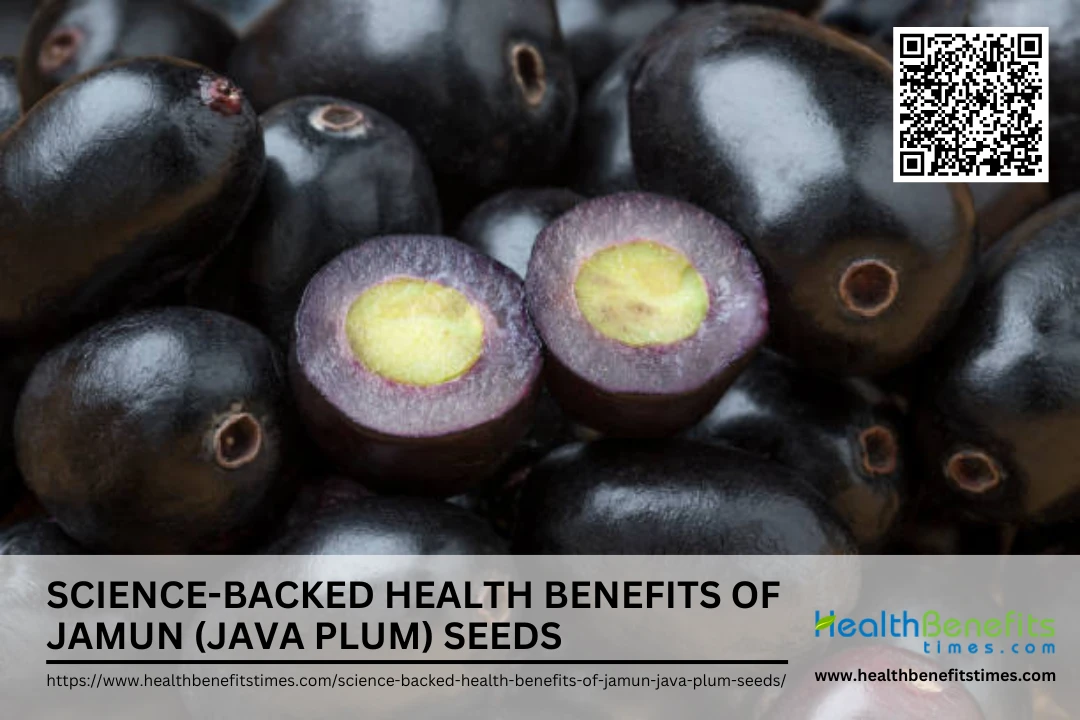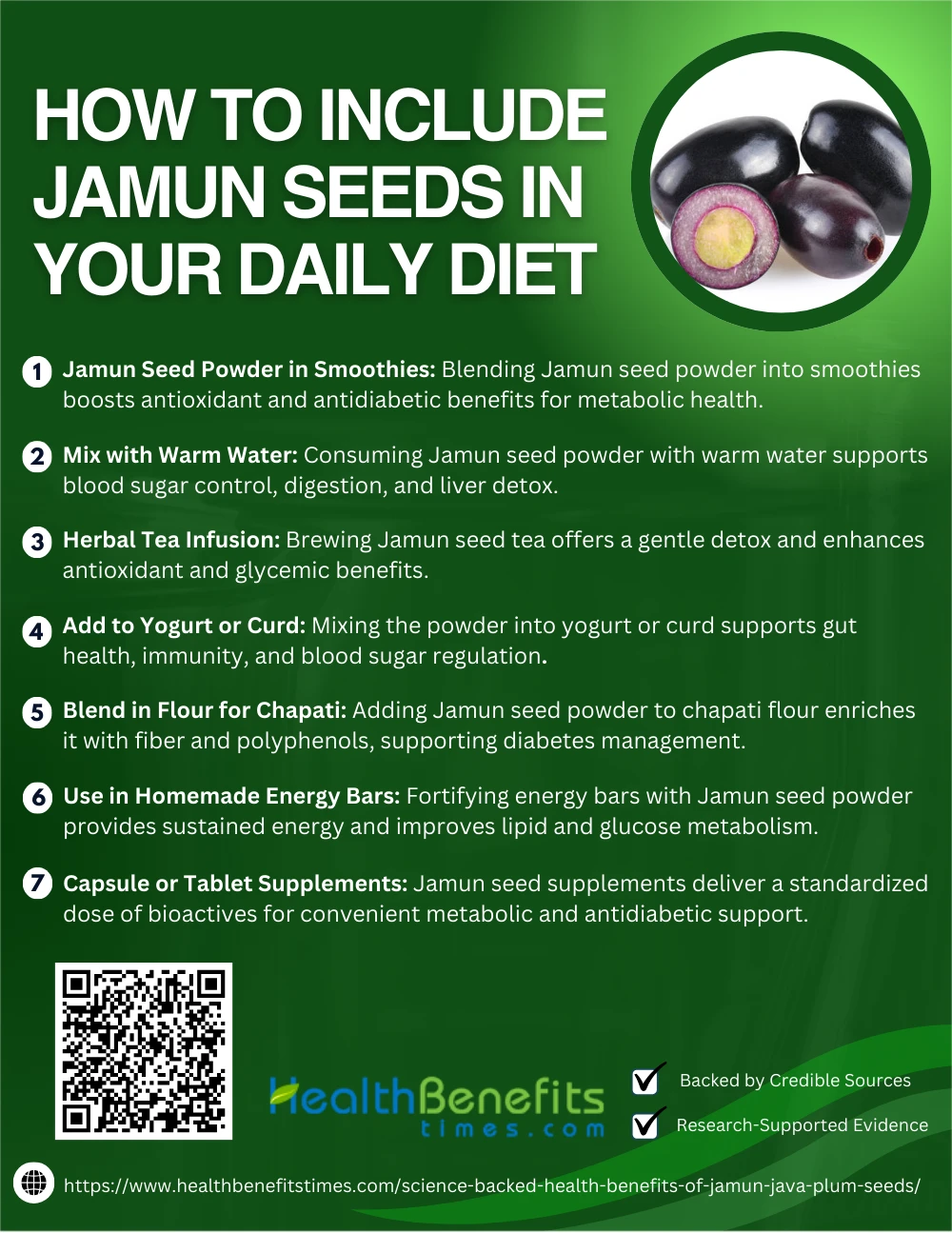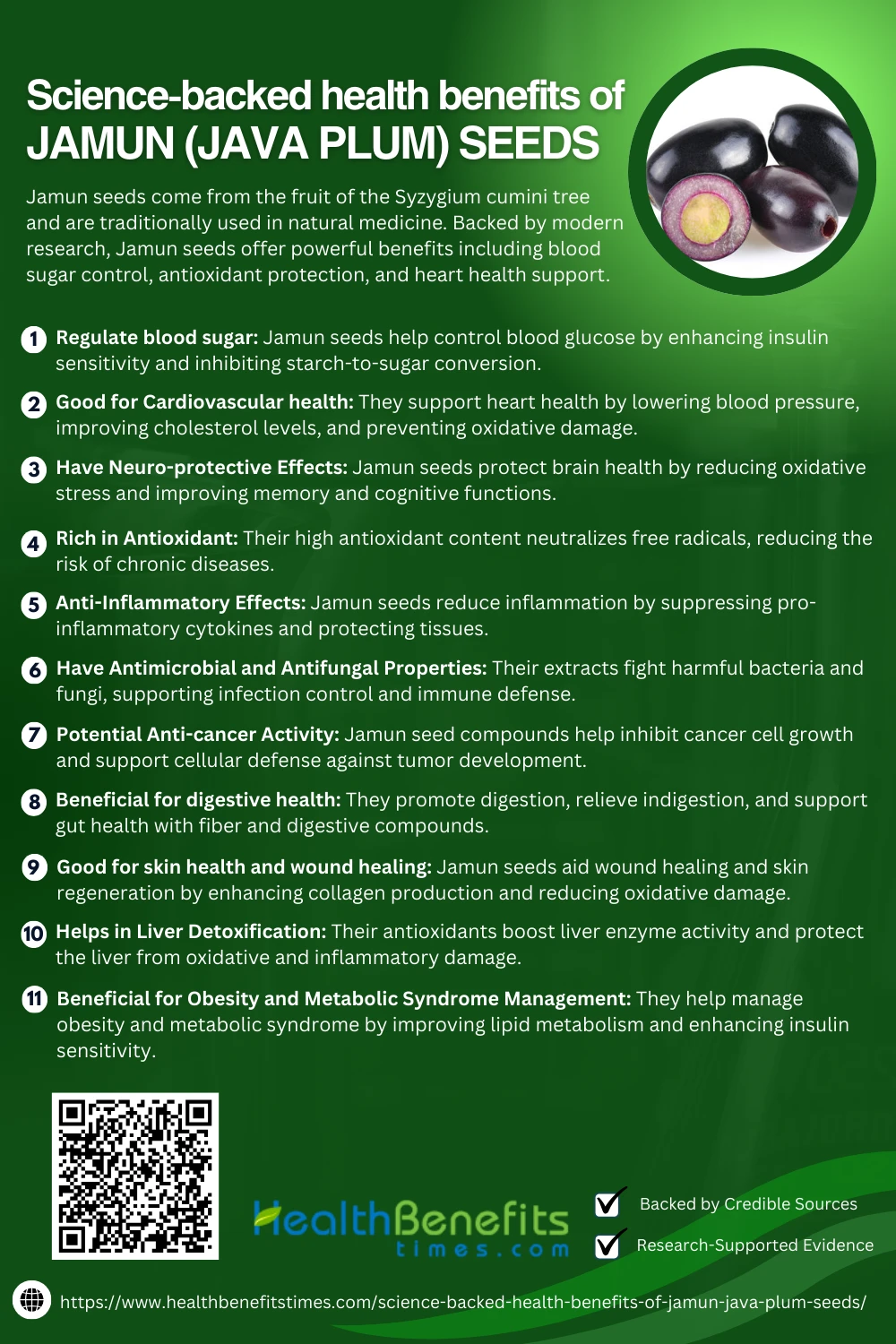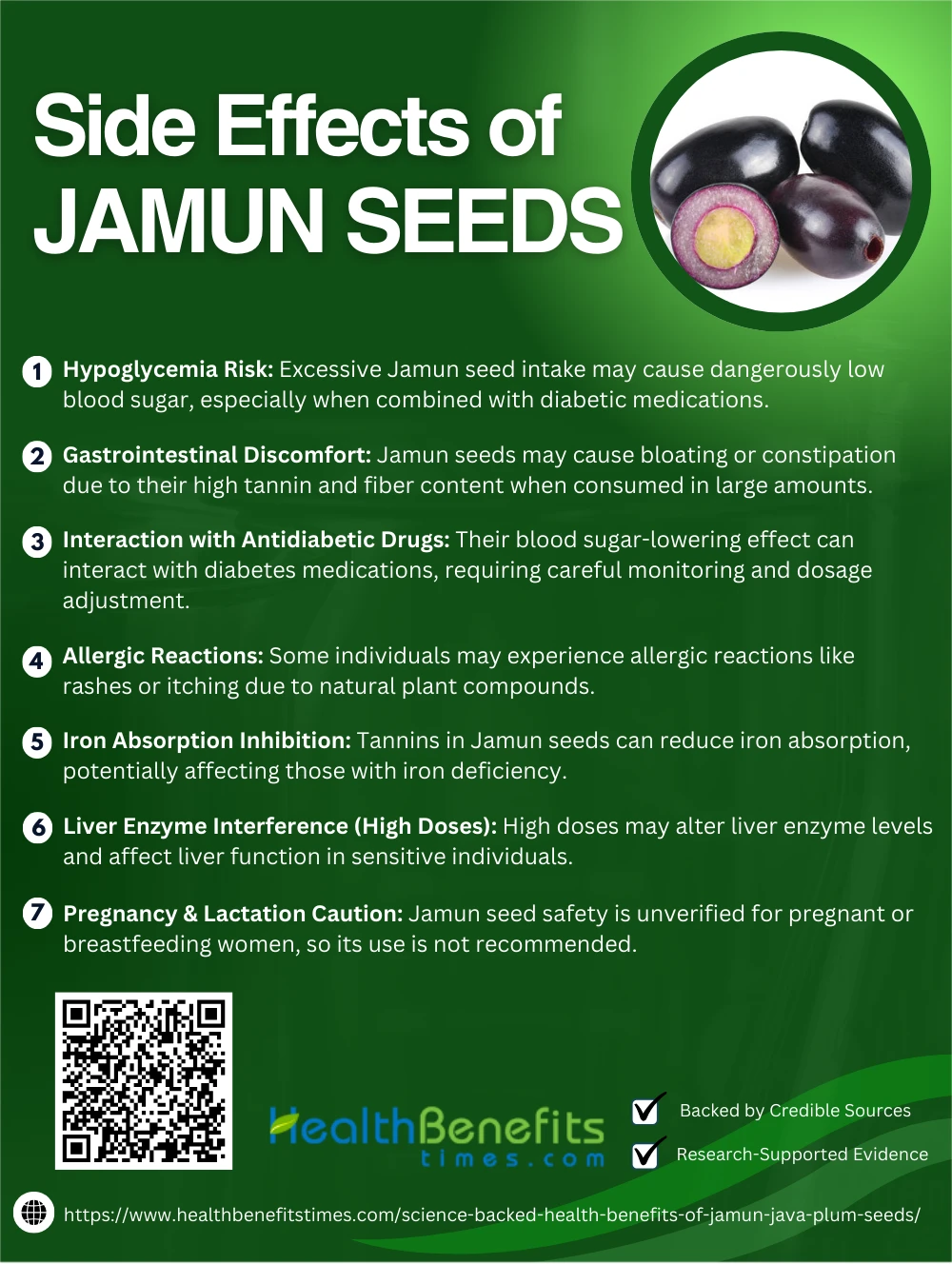- Jamun seeds come from the fruit of the Syzygium cumini tree and are traditionally used in natural medicine.
- Backed by modern research, Jamun seeds offer powerful benefits including blood sugar control, antioxidant protection, and heart health support.
- Rich in bioactive compounds, they are gaining attention as a natural remedy for diabetes, inflammation, and liver disorders.
 Jamun seeds, derived from the fruit of Syzygium cumini, are hard, almond-shaped kernels that have been used traditionally in Ayurvedic and Unani medicine for treating diabetes, infections, and digestive issues due to their potent bioactive constituents. In recent years, Jamun (Java Plum) seeds have garnered significant scientific interest due to their diverse pharmacological properties and dense phytochemical profile. These seeds contain essential bioactive compounds such as jamboline, ellagic acid, flavonoids, and tannins, which exhibit strong antioxidant, anti-diabetic, and anti-inflammatory effects. Clinical and preclinical research confirms that Jamun seed extracts not only help regulate blood glucose levels but also show promising anti-proliferative and cardio-protective properties.
Jamun seeds, derived from the fruit of Syzygium cumini, are hard, almond-shaped kernels that have been used traditionally in Ayurvedic and Unani medicine for treating diabetes, infections, and digestive issues due to their potent bioactive constituents. In recent years, Jamun (Java Plum) seeds have garnered significant scientific interest due to their diverse pharmacological properties and dense phytochemical profile. These seeds contain essential bioactive compounds such as jamboline, ellagic acid, flavonoids, and tannins, which exhibit strong antioxidant, anti-diabetic, and anti-inflammatory effects. Clinical and preclinical research confirms that Jamun seed extracts not only help regulate blood glucose levels but also show promising anti-proliferative and cardio-protective properties.
Nutritional and Phytochemical Composition of Jamin (Java plum) seeds
Jamun (Java plum) seeds are rich in vital nutrients and phytochemicals like flavonoids, polyphenols, and alkaloids, which contribute to their therapeutic properties and support various health benefits scientifically.
Jamun seeds are rich in flavonoids, a class of polyphenolic compounds known for their powerful antioxidant activity. These compounds help scavenge free radicals, thereby reducing oxidative stress and inflammation. Flavonoids like quercetin and kaempferol found in Jamun seeds contribute to their anti-inflammatory, cardioprotective, and antidiabetic effects.
2. Jamboline (Alkaloid)
One of the most therapeutically significant components of Jamun seeds is jamboline, an alkaloid known to reduce the conversion of starch into sugar, thus helping control blood sugar levels in diabetics. It plays a key role in regulating glycemic spikes, making it a natural candidate for managing Type 2 Diabetes.
3. Ellagic Acid
Ellagic acid, a potent polyphenol found in Jamun seeds, exhibits both anti-carcinogenic and antioxidant effects. It has been shown to inhibit the mutagenic activity of various chemicals and reduces DNA damage, contributing to cellular protection and potential chemoprevention.
4. Dietary Fiber
Jamun seeds are a notable source of dietary fiber, aiding in digestion, promoting gut health, and regulating bowel movements. Fiber also contributes to satiety, assists in lowering cholesterol, and supports stable blood sugar levels, adding to the seed’s antidiabetic profile.
5. Gallic Acid
Gallic acid present in Jamun seeds is known for its antimicrobial, antioxidant, and anti-inflammatory properties. It helps modulate enzymatic activities and has been shown to protect against oxidative tissue damage, making it useful in liver, skin, and cardiovascular health contexts.
6. Tannins and Saponins
These natural phytochemicals have been identified in high concentrations in Jamun seeds and are known for their anti-diarrheal, antimicrobial, and cholesterol-lowering effects. Tannins also exhibit astringent properties, while saponins aid in immune regulation.
7. Micronutrients (Iron, Calcium, Phosphorus)
Proximate composition studies show Jamun seeds contain trace minerals like iron, calcium, and phosphorus, which contribute to bone health, oxygen transport, and cellular metabolism. These minerals support overall systemic health when Jamun seed powder is incorporated in functional foods.
8. Sterols and Terpenoids
Jamun seeds also contain plant sterols and triterpenoids, compounds known for reducing cholesterol absorption and exhibiting anti-cancer effects. These phytochemicals are linked to improvements in liver enzyme function and hormonal balance.
Key health benefits of Jamun (Java Plum) Seeds
Jamun (Java plum) seeds offer a range of science-backed health benefits, including blood sugar control, antioxidant protection, anti-inflammatory effects, and support for heart, liver, and digestive health.
Jamun (Java Plum) seeds have demonstrated potent antidiabetic effects by reducing fasting blood glucose levels and enhancing insulin sensitivity in diabetic models (Academia.edu). The presence of bioactive alkaloids like jamboline helps inhibit starch-to-sugar conversion (nnpub.in). Animal studies confirmed hypoglycemic effects from seed extracts. (1) Additionally, Jamun seed powder improved metabolic biomarkers in clinical trials and supported long-term glucose control. (2) (3)
2. Good for Cardiovascular health
Jamun (Java Plum) seeds possess remarkable cardioprotective properties due to their rich polyphenolic and antioxidant content. Studies show that these seeds help lower blood pressure and lipid levels by inhibiting LDL oxidation and enhancing HDL function, as observed in hypertensive models. (3) The flavonoids in the seed extract also modulate endothelial function, reducing the risk of atherosclerosis. (4) Moreover, animal studies confirm their ability to suppress lipid peroxidation, further improving cardiac health. (5) Regular supplementation demonstrated a decline in hyperlipidemia-associated markers in humans. (6) Their inclusion in functional foods is now being encouraged for holistic heart care. (7)
3. Have Neuro-protective Effects
Jamun seeds demonstrate promising neuroprotective effects through their potent antioxidant, anti-inflammatory, and acetylcholinesterase inhibitory properties. In Alzheimer’s disease models, seed extracts significantly reduced oxidative stress and improved cognitive functions. (5) Key bioactive compounds like gallic acid and ellagic acid offer neuronal protection against free radical damage. (8) Furthermore, jamun seed supplementation helped restore memory and synaptic health in diabetic-induced dementia models. (9) Their ability to stabilize neurotransmitter levels adds to their neurotherapeutic role. (10) Finally, systematic reviews emphasize their pharmacological scope in managing neurodegenerative conditions. (11)
4. Rich in Antioxidant
Jamun (Java Plum) seeds are potent reservoirs of antioxidants, including polyphenols, flavonoids, and anthocyanins, which combat oxidative stress and free radical damage. These compounds enhance cellular defense mechanisms and may prevent chronic diseases. (12) Studies confirm significant total antioxidant capacity in seed extracts, with gallic acid being a major contributor. (4) (8) Further, antioxidant activity correlates with high phenolic content, making jamun seeds viable for nutraceutical use. (6) (7)
5. Anti-Inflammatory Effects
Jamun seeds exhibit notable anti-inflammatory activity due to their bioactive compounds like ellagic acid and flavonoids, which inhibit pro-inflammatory mediators. Their effectiveness in reducing inflammatory markers was documented in in vivo models. (12) Studies show significant downregulation of cytokines like IL-6 and TNF-α. (9) Polyphenols in jamun seeds protect tissues from inflammatory damage. (13) Clinical trials also support their role in arthritis management, positioning jamun as a natural anti-inflammatory remedy. (4) (6)
6. Have Antimicrobial and Antifungal Properties
Jamun (Java Plum) seeds are effective natural agents against microbial infections due to their rich phytochemical content, including flavonoids and tannins. Extracts have shown inhibitory action against bacterial strains like E. coli and Staphylococcus aureus. (12) Aqueous and ethanolic extracts also exhibit strong antifungal activity against Candida albicans. (14) The seeds disrupt microbial cell walls, enhancing their therapeutic scope. (15) These effects align with the seed’s high phenolic content, and support its role in antimicrobial formulations. (6) (4)
7. Potential Anti-cancer Activity
Jamun seed extracts possess promising anticancer properties, attributed to their rich profile of bioactive compounds like ellagic acid, quercetin, and flavonoids. In experimental models, seed extracts suppressed the proliferation of cancer cells, particularly in breast and colon cancer lines. (14) These compounds induce apoptosis and cell cycle arrest, while reducing oxidative stress linked to tumorigenesis. (4) (15) Antioxidant-rich phytochemicals also modulate cancer signaling pathways, and support therapeutic development. (8) (6)
8. Beneficial for digestive health
Jamun seeds enhance digestive function due to their astringent and carminative properties, which help regulate bowel movements and manage indigestion. They stimulate liver enzymes and promote bile secretion, supporting nutrient absorption. (12) Polyphenols in jamun seed extract also act as natural antidiarrheal agents. (6) Traditional Ayurvedic texts cite them for dysentery and flatulence. (16) They exhibit mild laxative effects due to dietary fiber content and support gut microbiota health. (5) (7)
9. Good for skin health and wound healing
Jamun seed extract supports skin health and wound healing by accelerating tissue regeneration and reducing oxidative skin damage. Antioxidants like flavonoids and tannins help protect skin cells from inflammation and UV-induced aging. (11) In vivo studies have shown faster healing in wounds treated with seed-based ointments. (5) The extract enhances collagen synthesis and fibroblast activity. (2) Traditional applications include treatment of ulcers and abscesses, while modern studies highlight its dermato-cosmetic potential. (4) (14)
10. Helps in Liver Detoxification
Jamun seeds contain potent antioxidants like ellagic acid and flavonoids that support liver detoxification processes. Studies highlight their role in enhancing liver enzyme activity and reducing oxidative stress-induced hepatic damage, promoting hepatoprotection in metabolic conditions. (17) Additionally, their high phenolic content aids in detox pathways, while Raza et al. (2021) showed anti-inflammatory benefits. (5) Their hepatoprotective capacity is also confirmed by Sane & Tripathi (2025) and Nath et al. (2023). (18) (4)
11. Beneficial for Obesity and Metabolic Syndrome Management
Jamun seed extracts exhibit anti-obesity and metabolic syndrome benefits through insulin sensitization and lipid-lowering effects. (3) Their bioactive compounds regulate blood sugar and adipogenesis, mitigating obesity-linked metabolic dysfunctions. (19) Clinical insights from Kumar & Singh (2021) show improvements in lipid profiles and inflammation. (10) Further, Srinivasan (2024) and Patani et al. (2024) emphasize its role in managing type 2 diabetes and metabolic risks. (20) (21)
How to include Jamun Seeds in your daily diet
Jamun seeds can be easily added to your daily diet by using them in powdered form, smoothies, herbal teas, or capsules, offering convenient ways to enjoy their health benefits.
 1. Jamun Seed Powder in Smoothies
1. Jamun Seed Powder in Smoothies
Adding Jamun seed powder to smoothies is a practical way to boost antioxidant and antidiabetic benefits in your diet. Its polyphenol-rich content aids in glycemic control and reduces oxidative stress, making it ideal for managing type 2 diabetes and metabolic risks. (22) Studies also support its synergy with probiotic blends in smoothies for added digestive benefits. (23) Further nutritional profiling by Kaur et al. (2022) confirms its potential as a functional food additive. (5)
2. Mix with Warm Water
Drinking Jamun seed powder with warm water every morning supports glucose regulation and liver detox. This simple method helps leverage its hypoglycemic effects, as shown by Kaur et al. (2022). (5) It also improves digestion and metabolic markers according to Reddy et al. (2022). (24) Additionally, Kapoor & Ranote (2015) emphasized its antioxidant retention in aqueous applications. (25)
3. Herbal Tea Infusion
Jamun seed tea infusions are a gentle yet potent functional beverage for daily detoxification and glucose control. The seeds’ polyphenols and ellagic acid offer antioxidant defense. (26) Brewing crushed seeds enhances bioavailability of actives and supports traditional Ayurvedic uses. (27) (28)
4. Add to Yogurt or Curd
Mixing Jamun seed powder into yogurt or curd enhances both flavor and functionality. The blend offers synergistic benefits for gut health, antioxidant intake, and blood sugar regulation, as demonstrated in a fortified dahi formulation study. (29) Antioxidant retention is further affirmed in Sukumar (2020), while Yadav et al. (2020) confirm immunomodulatory potential. (30) (31)
5. Blend in Flour for Chapati
Incorporating Jamun seed powder into chapati flour enhances its nutritional value, especially for glycemic control and antioxidant properties. Studies show its richness in polyphenols and dietary fiber improves metabolic functions. (32) Blending 5–10% of the powder into wheat flour preserves texture while improving health and supports diabetic-friendly diets. (33) (34)
6. Use in Homemade Energy Bars
Homemade energy bars enriched with Jamun seed powder provide a potent mix of fiber, minerals, and antioxidants. Fortifying bars with 5%–8% seed powder boosts functional benefits, such as lipid regulation and glucose modulation. (35) Its natural bioactives offer sustained energy and metabolic balance. (36) (37)
7. Capsule or Tablet Supplements
Jamun seed capsules offer a convenient method to access antidiabetic and antioxidant properties. Standardized doses ensure controlled intake of active bioactives like jamboline, proven to manage hyperglycemia. (38) Clinical studies affirm benefits for metabolic syndrome and highlight its therapeutic safety. (39) (27)
Side effects of Jamun Seeds
While Jamun seeds offer many health benefits, they may cause side effects like low blood sugar, allergies, or digestive discomfort if consumed excessively or without proper guidance from a healthcare professional.
Jamun seed powder exhibits potent antidiabetic effects, but excessive intake can lead to hypoglycemia, particularly in patients already using glucose-lowering drugs. Active compounds like jamboline inhibit glucose release. (38) Clinical reviews confirm its hypoglycemic potency and advise caution in dosage and drug interaction scenarios. (27) (39)
2. Gastrointestinal Discomfort
Though nutritionally rich, Jamun seeds contain tannins and complex fibers that may cause mild gastrointestinal discomfort, including bloating or constipation. These effects are dose-dependent and more common with powdered supplements. (27) Studies note astringency-induced gut sensitivity and recommend moderated use. (28) (38)
3. Interaction with Antidiabetic Drugs
Jamun seeds exhibit glucose-lowering properties that may interact synergistically or antagonistically with antidiabetic medications, altering their efficacy or causing hypoglycemia. Active components like jamboline mimic insulin-like activity. (38) Research warns against uncontrolled supplementation and suggests patient-specific evaluation. (39) (27)
4. Allergic Reactions
While rare, Jamun seed allergy can manifest in sensitive individuals as rashes, itching, or oral irritation. These reactions may result from natural phenolic compounds or cross-sensitivity with other fruits in the Myrtaceae family. (27) Documented cases highlight the need for allergy screening and personalized dosage awareness. (38) (28)
5. Iron Absorption Inhibition
Jamun seeds are rich in tannins and polyphenols, compounds known to inhibit non-heme iron absorption in the gut. This effect, if prolonged, may impact iron stores in iron-deficient individuals. (27) Research supports limiting excessive intake with meals and calls for caution in anemic populations. (39) (38)
6. Liver Enzyme Interference (High Doses)
High doses of Jamun seed extract may alter liver enzyme activity, especially in those with preexisting liver issues. Bioactive compounds like ellagic acid influence hepatic metabolism. (28) Long-term use without supervision could disrupt liver detox pathways or cause enzyme elevations. (38) (27)
7. Pregnancy & Lactation Caution
The use of Jamun seeds during pregnancy and lactation is not well-studied, making their safety profile unclear. Limited toxicological data raise concerns about potential fetal or neonatal effects. (27) Experts recommend avoiding it due to possible metabolic modulation and lack of reproductive toxicity trials. (38) (28)
Conclusion
Jamun (Java plum) seeds are a powerhouse of nutrition and bioactive compounds that support a variety of health benefits backed by scientific studies. From managing blood sugar levels and reducing inflammation to offering antioxidant protection and promoting heart and liver health, these seeds hold immense therapeutic potential. While traditional medicine has long valued them, modern research continues to validate their effectiveness. However, it’s essential to consume them responsibly and consult with a healthcare provider, especially for those with existing medical conditions. Including Jamun seeds in your daily routine can be a natural and effective step toward better overall health.




